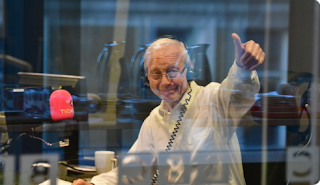Guardian editor-in-chief Katherine Viner quoted by Chadwick: “I am personally completely devastated that it was ever published in any form in the Guardian, and that we caused distress to so many people.”
David Yelland @David Yelland on Twitter: "Dick Emery died in 1983. Is this really the best The Sun backbench could come up with on a day like today?"
Robert Peston @Peston on Twitter: "If you are under 40 and you understand this reference, do let me know."
David Yelland @David Yelland on Twitter: "Of all the “Brexit editors” the most nuanced and intelligent is Geordie Greig at Mail. Here he treats Judges fairly and he ran Peter Oborne too today. Kudos to him but wish he’d back a 2nd referendum as he could change history.....maybe.... you never know...."
David Yelland @David Yelland on Twitter: "Of all the “Brexit editors” the most nuanced and intelligent is Geordie Greig at Mail. Here he treats Judges fairly and he ran Peter Oborne too today. Kudos to him but wish he’d back a 2nd referendum as he could change history.....maybe.... you never know...."
John Humphrys, presenting the Today programme for the last time after 32 years, on the BBC: “There’s a lot wrong with it as an organisation, there’s a lot wrong with every organisation, and it’s facing a lot of challenges from social media and changing behaviours. But I believe we need the BBC as much now as we ever have done, I simply can’t imagine this country without it - it is an unthinkable thought...Today matters for tomorrow. And if that’s a rather corny way to end my years on the programme well so be it. And that’s it from me.”
John Humphrys in the Daily Mail on the BBC after the EU referendum: "Leave had won – and this was not what the BBC had expected. Nor what it wanted.Their expressions were as grim as the look on the face of a football supporter when his team’s star player misses the penalty that would have won them the cup. Bosses, almost to a man and woman, could simply not grasp how anyone could have put a cross in the Leave box on the referendum ballot paper. I’m not sure the BBC as a whole ever quite had a real grasp of what was going on in Europe, or of what people in this country thought about it.’
Ben Judah in The Atlantic: "To her fans, Cadwalladr is an icon—a brave, irreverent, truth-seeking missile, exposing a nexus of corruption that is subverting our body politic, not only the Woodward and Bernstein of Brexit, but also its Emmeline Pankhurst, tirelessly campaigning for what she sees as a just outcome. But to her opponents, she is something else: a hysterical middle-aged conspiracy theorist, someone who pushed her stories beyond what the facts supported and who was willing to legally threaten journalists she was working with to get her way—or, in the words of the BBC journalist Andrew Neil, a “mad cat woman.”
Huff Post's political editor Paul Waugh @paulwaugh on Twitter on Monday: "Just worked out that if the statutory 32-hour week applied to my coverage of #LabourConference2019, I would have clocked off around 8.30am today."
New York Times publisher A.G. Sulzberger in a comment: "In attacking American media, President Trump has done more than undermine his own citizens’ faith in the news organizations attempting to hold him accountable. He has effectively given foreign leaders permission to do the same with their countries’ journalists, and even given them the vocabulary with which to do it. They’ve eagerly embraced the approach. My colleagues and I recently researched the spread of the phrase 'fake news,' and what we found is deeply alarming: In the past few years, more than 50 prime ministers, presidents and other government leaders across five continents have used the term 'fake news' to justify varying levels of anti-press activity."











No comments:
Post a Comment